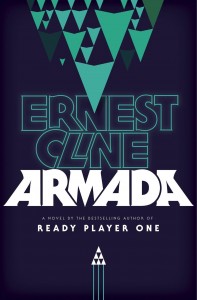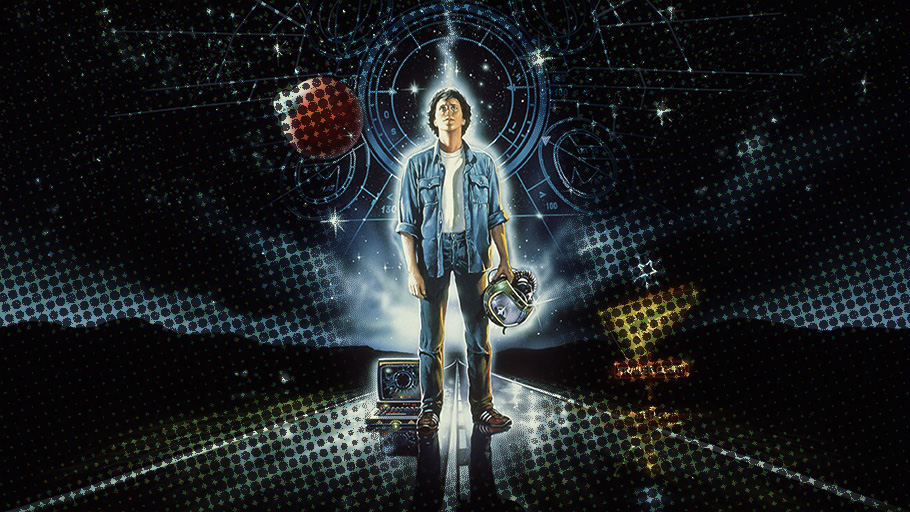
Ernie Cline’s novel Armada dropped last week with an enormous publicity campaign that’s sure to get this book selling exceptionally well. Cline has been riding high on his debut novel, Ready Player One, an Easter-egg infused novel that hit the nerd sweet spot with a hefty dose of references and nostalgia. The problem with Armada is that it’s absolutely, fucking terrible.
The plot is basic. A spacecraft drops by the school of one high school gamer, Zack Lightman, and tells him what absolutely every gamer wants to hear: Aliens are about to attack Earth and a secret military organization has shepherded video games, movies, novels and television shows to help attune humanity into fighting back against the alien invaders. On top of all that, Lightman’s one of the top gamers in the world, and that because of his scores in Armada, he’s one of the last best hopes for humanity. He’s brought to a secret base on the Moon, where he meets his long-lost (and presumed dead) father, who’s helping to oversee the counter attack.
I enjoyed Ready Player One quite a bit: it was a fun read that had some neat recursive things going for it: it was a book about a video game that relied on the tropes and conventions of real-world video game history, and it worked well enough. Armada is a pretty far cry away from this, going through a story that’s essentially a rehash of Ender’s Game and The Last Starfighter. Hardly a sentence goes by without Cline dropping a reference to something from the 1980s, and as it becomes more cringe-worthy, it feels as though Cline is simply stuck in the past, unable or unwilling to grow beyond geek-man-child stage and reenter the present.
The problem with Armada is that it’s absolutely, fucking terrible.
This bothers me a great deal. The decade was responsible for an incredible surge of creative properties, but it isn’t the only decade when it comes to science fiction or fantasy; you’d never guess it from the endless references. Geeks have always been interested in shibboleth, sorting out who belongs and who doesn’t in nerd circles. Cline, throughout Ready Player One and Armada, drops references to everything from films to television to games to the occasional novel, and seems to be establishing a sort of precedent: if you don’t recognize these sacred tomes, you don’t belong. If you haven’t put in the hours that Zack Lightman and Wade Watts have in establishing their own geek cred, you’re not a ‘true’ geek worthy of the title.
There’s been a bunch of stories that have been incredibly popular that seem to do this sort of listing: Cline’s novels, for one, but also shows such as The Big Bang Theory, is essentially lightly-improvised lines of dialogue strung together with a whole bunch of ‘in the know’ references to any number of geek things. The obsession with checking off the boxes and making a set of qualifications to weed out outsiders isn’t anything new to the science fiction or fantasy circles, but it’s tiring to see after such a long history.
There’s the story of a geek guy meeting a geek girl, where he interrupts her when she expresses an interest in Star Wars or Star Trek or Battlestar Galactica and interrogates her on the minutia of the world. I’ve seen it happen before (hell, I’ve probably done it myself), and it’s just flat out not good for any sort of community. There’s the personal stories of that one lone geek at high school who gets picked on or slammed into a locker for carrying around a Star Wars novel, D&D Manual or Magic: The Gathering Cards, and how the stories that they read carried them through those dark times. Never mind that High School isn’t some sort of fantasy quest to be metaphorically endured, I sometimes wonder about the widespread validity of those stories, or if it’s just a story that we tell ourselves as part of our collective nerd mythology. As books like this and shows such as The Big Bang Theory have demonstrated (not to mention my hometown, where you can spot shirts of Superman, Flash and Green Lantern on the local rednecks) Geek stories appeal to just about everyone, especially now. I think it says more about the high school kid with problems getting along with his classmates and less to do with the kid who blew through Ender’s Game for the tenth time.
Within this archetype story, we always complain that we wished that there were more people who were into Star Wars, D&D and McCaffrey’s Pern novels, but when it comes to the end of the day, we seem to filter out the people who we don’t perceive as being good enough, unless their interests and backgrounds line up perfectly with our own. I’ve seen many people get worked up over the quality of other costumers at conventions and how they’ve only jumped on some sort of bandwagon because science fiction and fantasy movies dominate the box office.

I want as many people as possible to read/watch/enjoy science fiction and fantasy, so that we can have a richer community of fellow nerds.
Some people might be attracted to it because it’s popular and because they saw a film/book/game that looked cool with plenty of people watching/reading/playing it. But so what? Why do you need to be born in the mid-1970s to properly appreciate standing in line for Star Wars or ET? Are you really less of a fan of The Lord of the Rings if you saw the films in the theaters and rushed to the store to pick up the books because you enjoyed it so much? Personally, I want as many people as possible to read/watch/enjoy science fiction and fantasy, so that we can have a richer community of fellow nerds.
This isn’t a good book on a story side, by any stretch of the imagination. Where Ready Player One was entertaining and goofy, this just got tedious and annoying to read. The references had a point in the story – it was a hunt for Easter eggs. Here, they’re just annoying and don’t really serve any point other than to establish, over and over again, that Lightman (read: Cline) is a nerdy kid. We get that from the first couple of pages. Armada feels very much like Cline trying to find some way to make a nerdy adolescent existence mean something greater than it really is. But in doing so, he sets out to define what exactly a geek is, and that vision is limited only to the references he lists off, which is a pretty limiting list of things: science fiction / fantasy did some pretty cool things in the 1990s/2000s, but you would hardly guess it from what Cline/His characters list off.
I really despise this manufactured image of a geek-man-child and related stories, as much as I’m made uncomfortable by the people who rush to fill the role. Armada is a book that rushes to fill that role, and in doing so, it ignores just about everything that makes a book readable: likable characters, a plot that makes sense (seriously, the ending is a pretty spectacular failure), and good supporting characters and elements that support the story rather than prop it up. When it isn’t cringe-worthy to read, it’s Picard-facepalm worthy when it comes to actually being a good story. Any novel that ends with (SPOILERS) something completely out of left field along the lines of ‘and then the aliens came and cured cancer, entered us into an intergalactic hegemony and then everyone lived happily ever after the end’, you’ve got a serious fucking problem. Maybe Cline is doing something more clever – subverting the tropes of video games to pull out a satirical work of fiction that makes us think differently about the genre. If that’s the case, you’d never guess under the weight of its failure of characters and story.
This is wish-fulfillment fiction, through and through, from the situation Lightman finds himself in to the few constructed, idealized women who appear in the book. Wish fulfillment isn’t necessarily bad: what person playing a video game hasn’t wanted to save the world? But how many people use it to define their existence? Lightman, in saving the world, has his many hours validated. He even puts in a scene at the end where his accomplishments are acknowledged by the high school bully who beat up on him!
Armada would work perfectly if there was some recursive thing about it that made all the references make sense. There’s been plenty of books / movies like this that went heavy on the nostalgia: John Scalzi’s Redshirts comes to mind, along with Austin Grossman’s fantastic novel You or even movies like Galaxy Quest. But the thing that made those books / movies excellent aren’t in Armada: it’s just an annoying, tedious read that made me want to throw the book across the room when I finished it.
This review was originally published by Andrew Liptak on his personal blog.


Thanks for that great honest review, which certainly has the ring of truth about it. I felt a bit like that even when reading Ready Steady One and inwardly groaned when I read the synopsis of this novel. I was born in the ’50s BTW…
Okay, but how do you REALLY feel?
But seriously, this was a great review. Ready Player One certainly foreshadowed most of these complaints, so I have no trouble believing what you say about Armada. RPO worked, as you say, because the form and the function were aligned. That’s the sort of a thing an author can only pull off once in a career (at least only once with the same conceit).
[…] At A Dribble of Ink, guest contributor Andrew Liptak tears Ernie Cline’s new novel, Armada, a new …. Why? Liptak argues that it sets up and reinforces the idea of the geek manchild, all the while being deeply exclusionary—which are huge problems in the sf community at the moment. […]
I remember once going to a birthday party that happened at a karaoke facility — a dedicated room with a bunch of large screen TVs and a huge karaoke library from which everyone could choose. And all it seemed like anyone was interested in were 80’s tunes. I tried singing a couple more contemporary ones (early 2000’s), and there was zero interest or participation. Finally I gave up and settled in for another rendition of “Ice Ice Baby”. These folks were all my age peers, born in the late 70’s, but it appeared that their tastes had been frozen at about the time they turned 13. Ernie Cline strikes me as similar — he would have been 18 in 1990. It’s kind of odd that someone would stake their geek cred to a decade they spent as a teenager; my most formative years were my early 20’s, and my taste in geek/pop/sff culture has never stagnated. If anything, I’m too restless, eschewing more classic or established SFF for the flavor of the week. I lived through the 80’s, but only got maybe 60% of the references in RPO, even though I found it entertaining. I’ve already purchased Armada audiobook, but will likely return it to Audible based on this review. I’m currently reading Kate Atkinson’s transcendent Life After Life and don’t know that I’ll be able to resist God in the Ruins afterward.